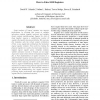Free Online Productivity Tools
i2Speak
i2Symbol
i2OCR
iTex2Img
iWeb2Print
iWeb2Shot
i2Type
iPdf2Split
iPdf2Merge
i2Bopomofo
i2Arabic
i2Style
i2Image
i2PDF
iLatex2Rtf
Sci2ools
MICRO
2005
IEEE
2005
IEEE
How to Fake 1000 Registers
Large numbers of logical registers can improve performance by allowing fast access to multiple subroutine contexts (register windows) and multiple thread contexts (multithreading). Support for both of these together requires a multiplicative number of registers that quickly becomes prohibitive. We overcome this limitation with the virtual context architecture (VCA), a new register-file architecture that virtualizes logical register contexts. VCA works by treating the physical registers as a cache of a much larger memorymapped logical register space. Complete contexts, whether activation records or threads, are no longer required to reside in their entirety in the physical register file. A VCA implementation of register windows on a single-threaded machine reduces data cache accesses by 20%, providing the same performance as a conventional machine while requiring one fewer cache port. Using VCA to support multithreading enables a four-thread machine to use half as many physical registe...
| Added | 25 Jun 2010 |
| Updated | 25 Jun 2010 |
| Type | Conference |
| Year | 2005 |
| Where | MICRO |
| Authors | David W. Oehmke, Nathan L. Binkert, Trevor N. Mudge, Steven K. Reinhardt |
Comments (0)

